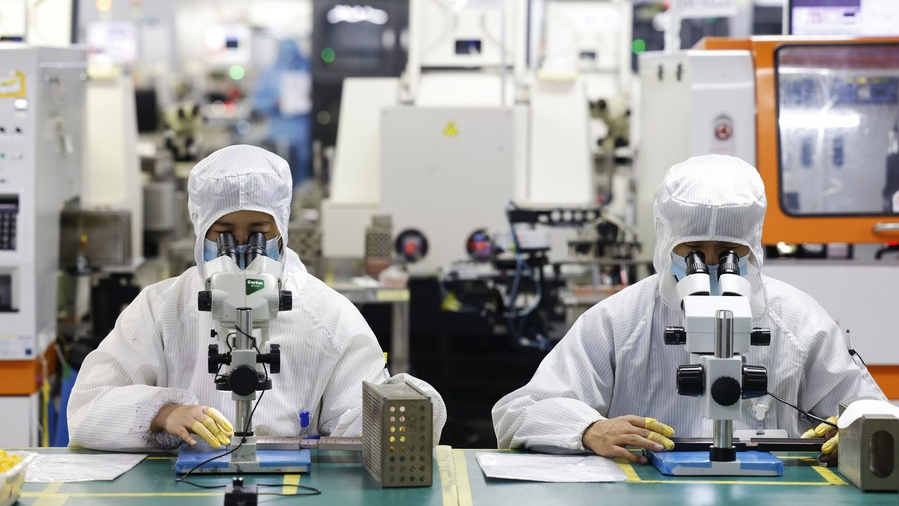
Editor's note: Liu Chunsheng is an associate professor at the Beijing-based Central University of Finance and Economics. The article reflects the author's opinion, and not necessarily the views of CGTN.
Japan has recently attempted to revise its semiconductor exports control measures under Japan's Foreign Exchange and Foreign Trade Control Law. The proposed revision is considered to be a threat to the chip industry in China and Japan and will cause great disturbance to the bilateral business relations.
The proposal aims to restrict the development of China's chip industry although Japan claims it doesn't target any specific country. Japan is also doing so at the request of the Unite States.
These measures may further restrict Japan's exports to China, making competition between the two countries in the chip industry even more intense. China is the largest chip importer in the world and has extensive cooperation with Japan in this field. If Japan strengthens its export restrictions against China, the chip supply chain and industry development in China will be affected.
Japan has been one of China's largest partners in the past and has extensive cooperation in technology and market in semiconductors. If Japan strengthens chip export restrictions, it will make cooperation between China and Japan in this field more difficult, negatively influencing business relations. As a consequence, it may cause more conflicts between two sides.
Furthermore, the global chip industry could also be adversely impacted by these measures. The chip industry is of strategic importance globally, with China and Japan being two important actors. If Japan strengthens export restrictions, it will affect the global chip industry, possibly leading to instability in the global supply chain and stagnation in the industry development.
Japanese semiconductor equipment makers hold an important position in the global chip industry. Their products cover the entire process from wafer manufacturing to packaging and testing. Several large companies control the market, including Tokyo Electron, Hitachi High-Tech, and Nikon. These companies have a significant share in production and sales. In particular, Tokyo Electron and Nikon have been among the top players in the global semiconductor equipment market.
Moreover, Japan's semiconductor industry chain is complete, from materials to manufacturing equipment to chip manufacturing, forming a complete set of industrial chains that provide important advantages for Japan's competitiveness in the global semiconductor market.
China is one of the largest importers of Japanese chip-making equipment. However, in recent years, due to the impact of the trade war between the world's two largest economies and China's policy toward semiconductor industry autonomy, exports of such Japanese equipment to China have declined.

Workers make chips for export at an electronics company in Sihong, east China's Jiangsu Province, February 23, 2022. /Xinhua
Workers make chips for export at an electronics company in Sihong, east China's Jiangsu Province, February 23, 2022. /Xinhua
China remains however an important market for Japanese semiconductor equipment makers, being one of the world's largest semiconductor markets. Therefore, many Japanese semiconductor equipment makers are still developing and promoting products that meet the demands of the Chinese market while seeking opportunities for cooperation with Chinese companies.
In essence, Japan's expected practice violates WTO rules as it builds obstacles and takes discriminatory measures against China.
Japan also claims that the amendment is due to national security consideration since chip equipment could be used for military purpose, even though it's only used to produce consumer electronics.
Japan cannot gain anything from this because its chip equipment makers will lose their market share in China. In the long run, China has no choice but to replace them with domestic manufacturers or from makers from other countries.
To address the impact of such a practice by Japan, China will strengthen independent innovation. As one of the world's largest chip importing countries, China has a huge market demand. China is taking steps to encourage enterprises to ramp up efforts in domestic market development through policy guidance, tax incentives and other means, and also promote industrial upgrading and transformation.
All in all, it is unwise for Japan to take such a decision. Japanese lawmakers and policymakers should have taken Japan's companies interests into account as any amendment on trade should not harm partners and violate basic market rules.
(If you want to contribute and have specific expertise, please contact us at opinions@cgtn.com. Follow @thouse_opinions on Twitter to discover the latest commentaries in the CGTN Opinion Section.)